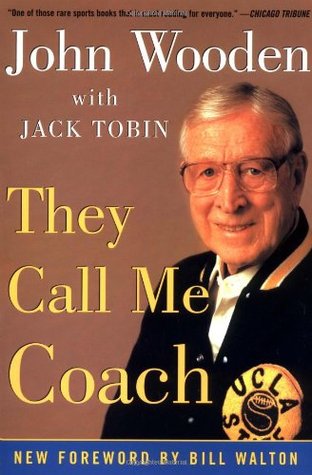
They Call Me Coach, by John Wooden with Jack Tobin
If you’ve never heard of John Wooden before, you’ve got some homework to do. You can take care of that HERE. But I can also clue you in a little bit. John Wooden was one of the greatest coaches of all time in any sport. He coached the Division I, UCLA Bruins for 27 seasons, and had many undefeated seasons there. He was the first person to be inducted into the National Basketball Hall of Fame as both a player and a coach. We know who Coach Wooden was because of his stellar coaching career. His many championships and wins propel him to the top of the list of all time greats. But for someone who had amassed so many games that ended in the “win” column, winning was secondary to John Wooden. You could probably say that They Call Me Coach explains what really was behind all those wins.

What it is not
They Call Me Coach is not a play by play instructional book. Coach Wooden is not providing coaches and players with the X’s and O’s here. This book is not meant to be an instruction of the minute details of the game. If you’re looking for advice on how to shoot your best free throw, or set up the perfect defense, you might want to look elsewhere. But if finding some insight on the philosophy and approach of one of the greatest coaches ever sounds a little intriguing to you, you might want to give it a shot!
What it is
They Call Me Coach is John Wooden’s autobiography. Modern day readers may find it refreshing to go back in time with Coach Wooden, and learn about his coming of age years. John Wooden passed away on June 4, 2010, at 99 years old. The experience of his youth contrasts so much with the modern world. A time when life was not characterized by that little computer we carry around in our pocket today, but also a time of a certain kind of freedom we are not used to. One of his early life experiences was when he and a friend hitch hiked across the mid west looking for work, in the summer between his junior and senior years in high school. He also recalls a time when, as a college student looking to earn some money to cover the expenses of going to school, he purchased the vending rights on board a train. He and a few of his friends ran what we would call a “side hustle” selling beverages and snacks to passengers; signaling a real knack for entrepreneurialism.
But Coach Wooden also emphasizes the profound effect that the people in his life had on him. This seems to be the common theme through out the book. Wooden had a reverential level of respect and admiration for many different individuals. You can’t help but think that the impact that others had on him, was a driving force for Coach Wooden to try to have that same kind of positive impact on others. He loved being a teacher and a coach. And he loved being an integral part to a young person’s success.

The Pyramid of Success
The hallmark of Wooden’s coaching philosophy.
In his book, How to Fail at Almost Everything and Still Win Big, famed Dilbert cartoonist and author, Scott Adams, talks about the importance of “systems” in the pursuit of personal success. He differentiates between people who emphasize goals when attempting to be successful at something, as opposed to systems. My estimation is that John Wooden would be the golden example of a “systems” oriented person, and he had the success to show for it. Wooden’s philosophical approach that is illustrated by his ‘Pyramid of Success’ is a “systems” model. It’s a way of life. And it’s worth looking into.
Overtime
Players, coaches, and True Ballers of all walks of life can find tremendous value in They Call Me Coach.
Check out these other resources that you could put to good use: (As an Amazon Associate I earn from qualifying purchases. This applies to all Amazon links.)